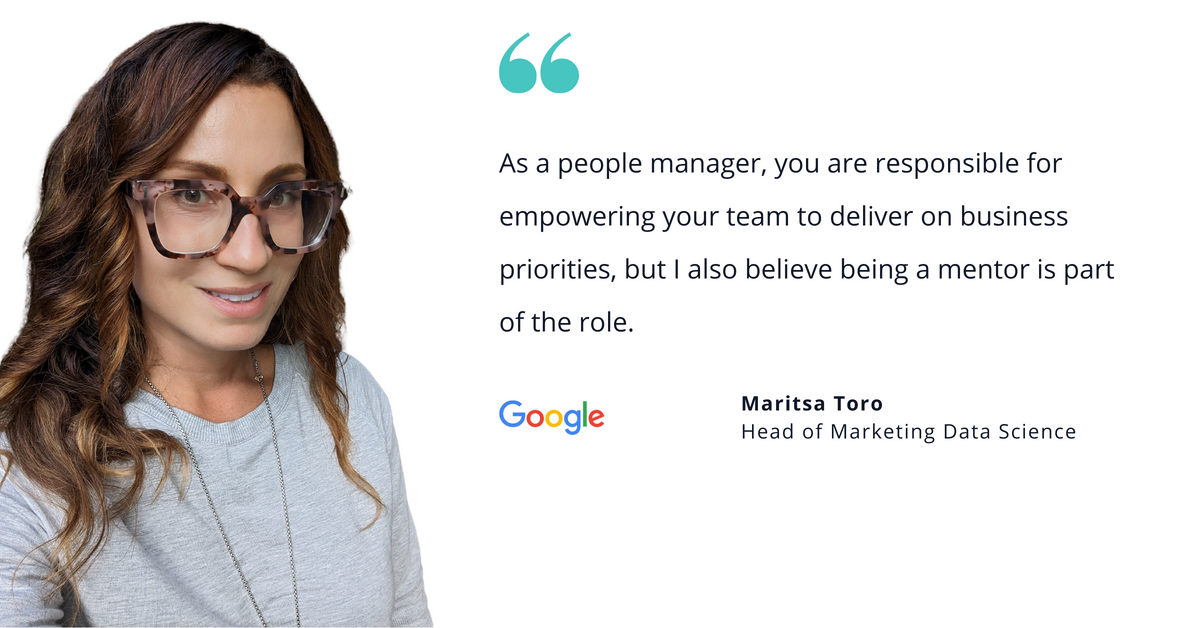Maritsa Toro still remembers mentoring a past colleague during his transition from finance to data science. She coached him through a lateral move, hired him onto her team of data scientists, and eventually, supported his own entrepreneurial ventures.
At each step, she was his biggest cheerleader.
“We still keep in touch,” she says with a smile. “I was privileged to write a reference letter for some of his venture capital rounds and was thrilled when he was awarded funding. I eagerly await an IPO or whatever is next in his professional journey. He’s amazing.”
As a first-generation college graduate, a second-generation Puerto Rican-American, and now a marketing data science leader at Google, Maritsa is well-equipped to guide others through challenges and growth. We asked her to share more about how she empowers junior talent, as well as the skills she believes are critical to success in marketing data science.
Empowering junior talent in technical development
Maritsa's move to Google helped to fulfill her potential as a people leader.
While she joined as an individual contributor, her accomplishments allowed her to climb to a manager-level position — and hone her leadership skills along the way.
“Google has absolutely made me a better people leader,” Maritsa confirms. “During a presentation, the vice president of my organization at the time shared that, as he grew in leadership and managed larger teams, he had to make the shift from ‘I’ to ‘we.’ This has become my mantra.”
For Maritsa, this means helping each individual thrive for the greater mission of the company.
To do so, she lives by six leadership principles.
1. Make space for your team to try new things
“My focus has always been about challenging the team to think beyond what is currently possible, connecting dots with others’ work, and making time for their passion areas. My team works very autonomously; there are many meetings both internal and external where I am the only manager not in the room. I am absolutely okay being behind the scenes and providing the needed support.”
2. Build psychological safety
“For me, moving from ‘I’ to ‘we’ meant building psychological safety where people can show up authentically at work. Once I began to role model vulnerability, the dynamic on my team changed for the better.”
3. Remove the fear of failure
“My doctoral program at Columbia believed that your research did not have to yield successful results to qualify for your degree. Their philosophy was that studies with negative findings are important learnings that help inform other researchers’ thinking. I bring this philosophy with me when coaching… It is okay to fail. It is okay to make mistakes. If the team truly feels comfortable taking risks, the next big idea is possible.”
4. Listen
“In the context of helping others grow, remember that it’s about them — so really listen and go deep to understand their challenges and goals by building trust through an honest exchange of information.”
5. Be transparent in decision-making
“For some, the perception of being a leader is skewed toward delegation of work and performance management. But there is so much more that goes into it, especially in regard to business development and why quantifying impact matters… Empowering junior team members and future leaders involves being transparent about decisions made at varying levels of leadership.”
6. Encourage involvement in employee resource groups (ERGs)
“In addition to a sense of belonging, ERGs can also offer valuable leadership and development opportunities to junior team members. These leadership positions can help strengthen communication skills for technical talent. You are learning ways to manage volunteers, building business cases for funding, developing the strategy for end-to-end program design, and presenting to executives to scale programs across different business functions and potentially at the company level.”
Critical skills in marketing data science
While these principles form the foundation of Maritsa’s leadership approach, she also emphasizes the importance of skill development for rising junior talent in marketing data science. And, at first, she was convinced that formal training was the key to success.
“However, I started to see engineers struggle with the commercialization of their data science solutions and products. I also saw MBA graduates struggle with identifying the right testing and modeling techniques to solve business challenges,” she recalls.
As the demand for talent outplaced supply, Maritsa had to open her sourcing requirements — and identified two important marketing data science skills.
She encourages fellow leaders to nurture both of these in rising talent:
Creative thinking & communication
“I started hiring talent with adjacent degrees such as economics or those who completed a data science boot camp, knowing that Google offers opportunities for someone to develop in the field with on-the-job training,” she explains.
“As I shifted my thinking to the capability of the person versus specific prior experiences, I discovered that, yes, a solid grounding in the theory is important, but most important is creative thinking and communication.”
Maritsa explains that marketing data scientists need to be able to translate business challenges into an algorithm and then customer insight. From there, they must evaluate the performance of the idea or theory to prove its value.
“To land commercialization, you need to be creative and you need to effectively communicate,” she says.
An evolving landscape
Maritsa recognizes that marketing data science is a constantly evolving field, and so is her leadership style.
“My perspective on coaching and mentoring continually evolves as I grow. As a people manager, you are responsible for empowering your team to deliver on business priorities, but I also believe being a mentor is part of the role and responsibilities,” she says. “Together, we can empower the next generation of leaders.”
Grow your career with Google! They’re hiring across marketing science and more. Check out the opportunities here.



